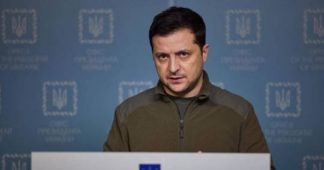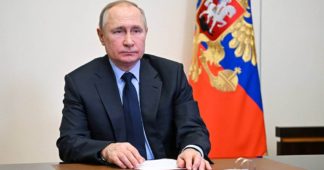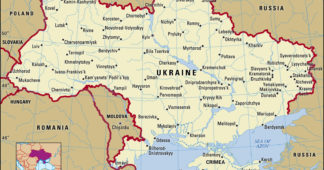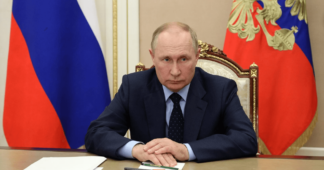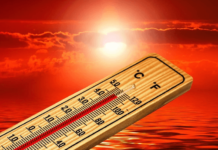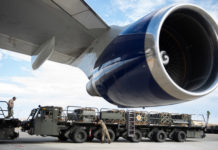Oct 1, 2022
Russia and Ukraine conflict has continued to escalate, as Russian President Vladimir Putin on Friday signed documents to accept the Donetsk, Luhansk, Zaporizhzhia and Kherson regions into Russia following referenda while Ukrainian President Volodymyr Zelensky announced a bid for fast-track membership of the NATO military alliance on Friday and ruled out talks with Putin, striking back at Moscow’s latest move. Meanwhile, China urged all sides to leave space for diplomatic negotiations in efforts to resolve the Ukraine crisis.
Chinese analysts said that the current situation is deteriorating and the conflict will definitely continue, and the earlier the negotiations restart, the less losses Ukraine and Russia would suffer.
Unfortunately, as the US has always involved and has successfully interrupted the previous peace talks, continued to fan flames with supply of new weapons to Kiev and fresh sanctions on Russia, causing the crisis to come to this stage with irreversible damage to both sides, so for the future peace talks, the key is that how Russia and the US could reach consensus at some point, experts said.
The treaties signing ceremony took place on Friday in the Grand Kremlin Palace, Moscow, and Putin delivered a speech about the “joining” of four Ukrainian regions to Russia.
Putin said “We call on the Kiev regime to immediately cease fire and all hostilities; to end the war it unleashed back in 2014 and return to the negotiating table. We are ready for this, as we have said more than once,” according to Kremlin’s website.”
But the choice of the people in Donetsk, Lugansk, Zaporizhzhia and Kherson will not be discussed. The decision has been made, and Russia will not betray it, Putin said.
This means that Russia will treat the four regions as its own territories no matter what other parties have to say about it, and the conditions and bottom-line of the negotiations have all been changed compared to the previous peace talks. If Kiev would like to return to the negotiation, it means it’s accepting the change of its territory, so it’s clear that the peace talk at this moment is very unlikely, analysts said.
Zelensky has responded to Russia with an attempt to speed up the process of joining NATO. In the previous peace talks, “Ukraine will not join NATO” was a precondition presented by the Russian side. According to Reuters, Zelensky signed the NATO application papers through video link clearly intended as a forceful rebuttal to the Kremlin after Putin held a ceremony in Moscow to incorporate the four Ukrainian regions into the Russian Federation.
“We are taking our decisive step by signing Ukraine’s application for accelerated accession to NATO,” Zelensky said in the video on the Telegram app.
But now, as per Zelensky ‘s words, Ukraine is already a “de facto NATO member” as it has received massive military assistance from NATO, especially from the US, so such move won’t affect Russia’s determination to complete its military operation, experts claimed.
Zhang Hong, an associate research fellow at the Institute of Russian, Eastern European and Central Asian Studies of the Chinese Academy of Social Sciences, told the Global Times that “Although Ukraine has received military assistance from NATO, it is still quite far away from truly becoming a NATO member. It can be said that Ukraine is currently only a NATO ally.”
If Russia enters a conflict with a real NATO member, it will trigger their collective defense mechanism, and Russia will be in fact having war with all NATO members, so a NATO ally and a NATO member are different, and maybe this is why Zelensky desperately wanted the NATO membership, as he wants to force the whole of NATO to join the war and help Ukraine take back what it has lost, said experts.
Given the tit-for-tat atmosphere, the conflict will likely further escalate, said Song Zhongping, a Chinese military expert and TV commentator. The key to a possible negotiation now is how Washington reacts, as the US has interfered in the previous rounds of talks, leading them to end with no results.
The earlier the negotiations can restart, the less loss both parties will suffer, Song noted.
It is likely that the conflict between Russia and Ukraine in the eastern part of Ukraine will continue and remain at the level of conventional war, as is the current situation on the ground. Russia’s partial mobilization will increase the intensity of the conflict and consolidate the eastern regions in Ukraine it currently controls. The conflict will continue to maintain such a state of war of attrition and stalemate.
Instead of creating conditions for cooling down the tension, the US has continued to fan flames. On Friday, the US House of Representatives passed a bill which includes an additional $12.3 billion in military and economic aid to Ukraine. On the same day, the US imposed wide-ranging sanctions on Russia over its formal recognition of the four Ukraine regions joining Russia, targeting hundreds of people and companies.
China calls for peace
Apart from the combat zones in Ukraine, the struggles between the West and Russia are also intensifying in the UN. Russia on Friday vetoed a UN Security Council resolution which described its attempts to hold four regions of Ukraine under Russian control earlier in the day with a formal ceremony in Moscow, as “a threat to international peace and security”, demanding that the decision be immediately and unconditionally reversed.
The draft resolution, circulated by the United States and Albania, was supported by ten of the fifteen members of the Council, including the US, France and Britain, with Russia voting against it. Four members abstained, Brazil, China, Gabon and India, according to the UN website.
“China calls on all parties concerned to exercise restraint, refrain from actions that exacerbate tensions, and leave space for settlement through diplomatic negotiations,” Zhang Jun, China’s permanent representative to the United Nations, said in his explanation of China’s vote on a Security Council draft resolution on Ukraine.
China’s position on the issue of Ukraine is “consistent and clear.” The sovereignty and territorial integrity of all countries should be safeguarded, the purposes and principles of the UN Charter should be observed, the legitimate security concerns of all parties should be taken seriously, and all actors conducive to the peaceful resolution of the crisis should be supported, Zhang Jun said.
China believes that “the pressing priority is to make every effort to de-escalate the situation, and guide the parties to restart diplomatic negotiations as soon as possible to open the door to a political settlement with legitimate concerns brought into the negotiations and viable options put on the table, in an effort to achieve an early ceasefire,” the ambassador said.
We remind our readers that publication of articles on our site does not mean that we agree with what is written. Our policy is to publish anything which we consider of interest, so as to assist our readers in forming their opinions. Sometimes we even publish articles with which we totally disagree, since we believe it is important for our readers to be informed on as wide a spectrum of views as possible.
